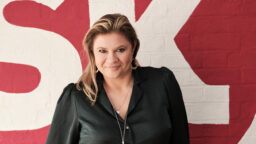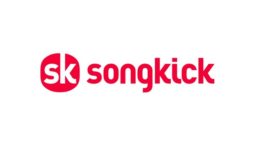Sarah Jones loves live music so much, she even got engaged at a gig.
As Prince returned for the encore during his legendary 2007 O2 residency and struck up the opening chords to Purple Rain, high up in one of the boxes, Jones – a huge fan of the Purple One – turned around to find her then-boyfriend, now-husband down on one knee.
“I just couldn’t speak,” she laughs. “I was like, ‘How did you get that past me?’”
Even these days, she’s still an avid gig-goer, and Jones – who was born in Wales but grew up in Essex – has no shortage of stories about how live music has been a key component in some of her life’s greatest moments.
She fizzes with enthusiasm for the experience, whether talking about her first ever gig (U2 at the old Cardiff Arms Park) or the most recent show she saw (Self Esteem at the O2 Forum Kentish Town); the classic rock gigs she’s taken her parents to in order to repay them for inspiring her love of music in the first place, or the time she held Eddie Vedder’s hand as he reached into the crowd at a Pearl Jam show.
“He had a bottle of red in one hand and my hand in the other,” she laughs. “Did he say anything to me? I think he was just like, ‘Let go of my hand!’”
And now, as General Manager of Songkick, the Warner Music Group-owned concert discovery service, she sees it as her mission to make sure the platform’s users never miss out on their own opportunity to enjoy similarly mind-blowing live
music experiences.
“I do think live music changes lives,” she grins. “I don’t think there’s anything that can match standing on that sticky floor with a warm pint in a plastic glass, sharing [the experience] with your mates.”
Fittingly for a former BBC executive – she spent 14 years at the corporation, most recently as Head of Digital & Operations, Business Development, having started her career as a media analyst with Ebiquity – she sees Songkick very much as a “public service”, helping to ensure punters don’t miss out on the gigs they want to see, while artists, venues and promoters get to reach everyone that might potentially enjoy what they do on stage.
And it’s a service that the public seem to be embracing. Jones says Songkick now has over 20 million users around the world and reports a post-pandemic “significant surge in global users”, particularly in emerging markets, as demand for live entertainment spiked as soon as lockdowns lifted.
It has, however, taken a while for everyone to appreciate Songkick’s value. Launched in 2007 as a start-up concert discovery platform/social network by Ian Hogarth, Michelle You and Pete Smith, in its early years it often seemed to be a good idea in search of a viable business model.
It later merged with CrowdSurge and moved into direct-to-fan ticketing, pioneering anti-scalping technology. In 2016, it reportedly sold nearly 500,000 tickets for Adele’s tour but, the following year, it became embroiled in an antitrust legal dispute with Ticketmaster.
That carried on separately after WMG bought the concert discovery part of the business in 2017 (Warner parent Access Industries had been an investor in the company). Live Nation/Ticketmaster eventually settled the case out of court, paying $110m and acquiring Songkick’s ticketing assets as part of the process.
Of course, that was all before Jones’ time (she joined Songkick as Commercial Director in 2018 before graduating to the top job last year) and she is understandably wary of the subject, keen to stress that Songkick works harmoniously in partnership with all primary ticketing companies, Ticketmaster included.
Similarly, while Songkick may be owned by Warner, Jones highlights that it is part of its WMX services division, removed from the recorded music and music publishing parts of the business, and works with artists signed to all record companies.
Jones has big plans to build on Songkick’s current position. She is proud to preside over an inclusive workplace culture, with a 50/50 gender staff split – almost unprecedented for a company with technology at its core.
An office refurb (Songkick is still based out in Shoreditch’s Silicon Roundabout enclave, although she’s travelled west to Warner Music HQ for today’s chat with MBW) and rebrand are on the way, and she promises a relaunch of “our whole industry product set in the next year”, to capitalise on the success of Songkick’s Tourbox tool, which helps artists, managers and agents manage and market their
tour dates.
With the pandemic (hopefully) receding in the rear-view mirror, Jones believes Songkick has gone full circle to return to something close to a beefed-up version of its original concept.
“Three people wanted to solve a problem for fans [so they’d] never miss another show, so they started scraping the internet and created this product,” she says. “We’re really close to that DNA now. We’re getting to the hearts of audiences’ issues, really going back to that utility, but on a much bigger scale.”
Warner doesn’t break out separate figures for Songkick, but Jones insists the platform is now “a really stable, revenue-generating business”.
She remains a little cagey on the details of exactly how Songkick makes that money (essentially a mix of advertising, monetisation of its B2B products and commission on ticket sales through third party vendors). But, fortunately, given everything going on right now in the live music market Songkick serves, Sarah Jones has plenty to say on almost everything else…
Being at a concert discovery service must have been challenging during the pandemic, when there were no concerts to be discovered?
The pandemic taught us a lot about business within live music, but it’s been great to get back to normal. We did a lot of pivoting, ran a few livestreams, looked at international commerce and did a lot of localisation, so we were still very busy.
Did you ever worry it was all over for live music?
No. I’ve been around the block a few times. It was obviously unprecedented, but the pandemic taught us how important live music is. In 2022, the market just went nuts and came back so strong. Live music is such an essential part of people’s lives. We’ve seen the whole experiential economy boom since the pandemic.
Although now there’s a cost-of-living crisis. What effect will that have on live music?
Live music is discretionary spend for consumers. It’s very much in the affordable luxury category. But people still want to be together. That sense of connection and community is really important, because we didn’t have it for so long.
I mean, look at what’s happening at the moment: [tours from] Madonna, Beyoncé, Taylor [Swift]… I don’t think we’ve ever seen a year like it. You will still see gigs be a strong part of that discretionary spend.
A lot of people in the industry are still concerned about the future though. If there are too many gigs and not enough money to go round, surely someone’s going to lose out?
Saturation could be a challenge in the next 12 months. What Songkick focuses on is connecting artists with users who really want to go to a show. And our industry tools are there for artists to really help them, whether it’s a saturated market or a dry market.
What if you’re a grassroots venue and you can’t afford such things?
Well, a lot of our services are absolutely free at the point of use. It is really tough out there. We are working on some initiatives with grassroots venues and it’s something that we really do care about.
Can you give us any information about those initiatives?
Not at present, no.
How does Songkick fit with the rest of the Warner Music empire?
Songkick is universal. It’s label agnostic, DSP agnostic, ticketing company agnostic…
So agnostic that you just used the word ‘Universal’ to describe it…
[Laughs] Yeah! We work with everyone and that’s really at the heart of what we do. Yes, it’s great being part of a record label, because it gives us real insight into how to help artists, but it’s all about us having our own autonomy.
Are any other music companies ever suspicious because of who owns Songkick?
No, I’ve actually never experienced that. We would never want to be perceived as a propaganda tool. I’ve looked after the commercial side of the business for four years now and I definitely place it within that neutral space.
What did you make of the recent Taylor Swift ticket sale furore?
It’s a real challenge when you have opportunities that are that big. And it’s really gutting if you’re a fan and you really want to get to a show. I’m sure there are a lot of lessons that have been learned around the scale of demand.
I don’t think we’re seeing that play out with Beyoncé, for example. It’s an access challenge. How do you create that equitable access to being able to get Taylor Swift tickets? Everyone’s looking at robust technology and systems and how you pace a sale. There are a lot of things that could be done differently, but also, it’s a massive artist.
What is the typical Songkick user like?
There’s not an average Songkick user. We have everyone, from [age] three to 66. I care just as much about parents being able to buy a gig ticket transparently as [I do] Gen Z.
It must be a challenge catering for everyone from hardcore music fans to people who only go to one gig a year?
I do think the utility that we’re offering is valuable for both scenarios. And if you’re going to one gig, you’re going to find out about 10 more. Maybe you’ll turn into a two or three or four gigs a year person.
If you could change one thing about today’s music industry, right here and now, what would it be and why?
I feel really passionately about the evolution of the live music industry in the transparency space. That’s a really important move for everyone.
It’s been a long time coming, but look how quickly we went to mobile tickets. So many services have globalised and become digitised overnight through necessity [during the pandemic].
There can be a lot of mystery and complexity around live music and I see our role as demystifying all of that.
We are here to make things simple. It really shouldn’t be that hard to be able to get a ticket to a show. And it shouldn’t be that hard to know about that show coming in.
And what will success look like for the new Songkick a little further down the line?
We need to make sure that our brand and identity really speaks to who we are. We will be globally expanding and launching in several languages.
I call it being ‘glocal’ – being a global brand at scale, but being locally relevant. Songkick has a real opportunity to be the home for live music, a real in-house consumer brand that’s there as a tool to help people get to gigs.

MBUK is available via an annual subscription through here.
All physical subscribers will receive a complimentary digital edition with each issue.Music Business Worldwide





